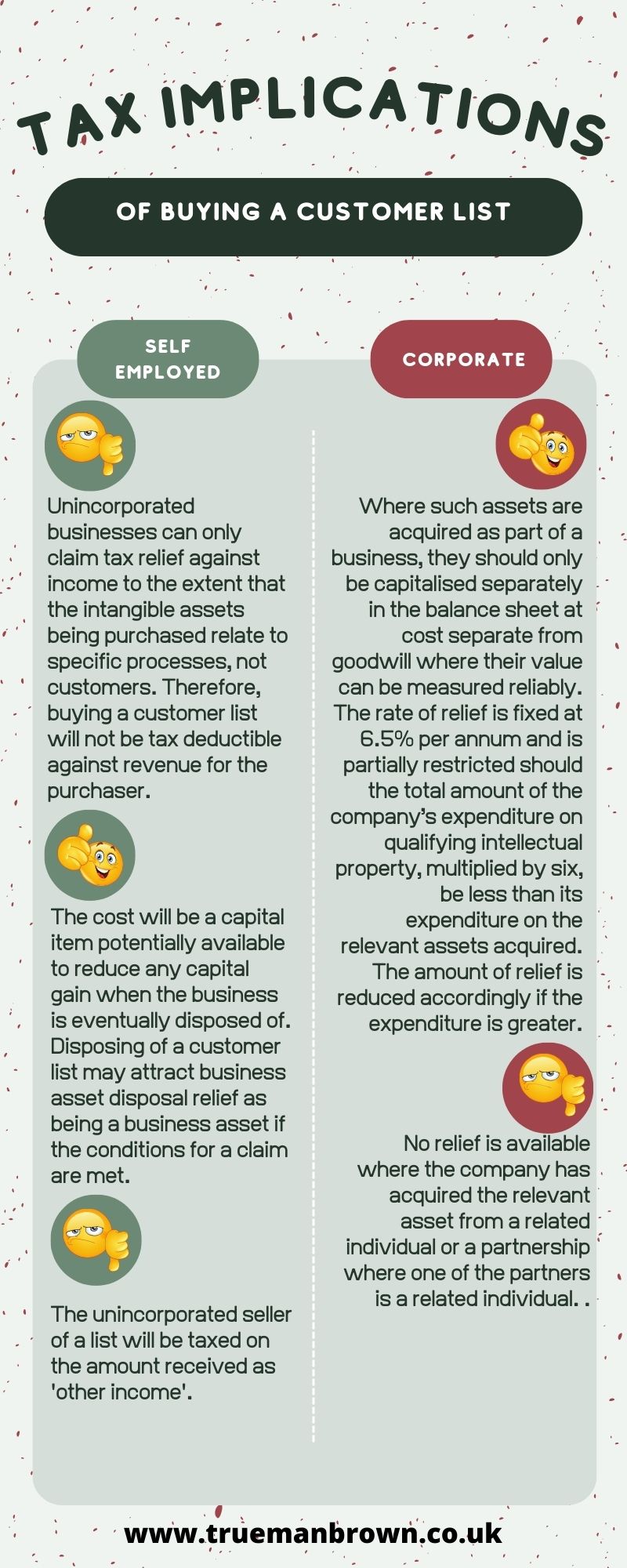Tax Implications of Buying a Customer List UK
When a business considers the tax implications of buying a customer list UK, it needs to recognise that the acquisition is not simply purchasing names and contacts, but acquiring a set of relationships, preferences and history.
This means that for tax purposes, the cost of acquiring the list is treated as an intangible asset rather than a straightforward deductible expense.
1. What is a “customer list”?
A customer list is more than just a directory of names and contact details.
It represents the relationship with a customer, together with their buying behaviour, contact history and sometimes the contract rights or goodwill associated with them.
From a tax-perspective, under the rules on tax implications of buying a customer list UK, such lists are treated as intangible assets that derive their value from a business’s intellectual or legal rights.
For example, when you purchase a list from another business, you acquire the right to market to those contacts — the value is in the customer relationship, not just the spreadsheet.
2. Self-employed and partnership purchasers — tax implications of buying a customer list UK
If you are a sole trader or partnership, the tax implications of buying a customer list UK are quite restrictive. Because the asset is an intangible relationship rather than a process or physical item, the cost is not deductible as a revenue expense.

Instead, the cost becomes a capital item, which may be relevant when you eventually dispose of the business or sell that list. At that point the cost can reduce any capital gain.
For the seller in an unincorporated business context, the sale proceeds will typically be taxed as “other income”.
In short: for self-employed businesses, immediate relief is not normally available under the tax implications of buying a customer list UK.
3. Company purchasers — corporate tax and the regime for intangibles
When a company acquires a customer list, the tax implications of buying a customer list UK are governed by the intangible assets regime (Part 8 of the Corporation Tax Act 2009 and relevant HMRC manuals).
Some key points for 2025/26:
-
Customer lists acquired on or after 1 April 2019 are explicitly treated as “relevant assets” within the regime.
-
A company may elect to write down the cost of such an asset at a fixed rate of 6.5% per annum subject to certain restrictions (e.g., only where acquired as part of the acquisition of a business and where qualifying IP assets are also acquired).
-
If the list is acquired from a related party or a partnership involving a related party, relief may not be available.
-
As at 2025/26, the fundamentals remain: the cost must be capitalised, properly valued, and the appropriate relief claimed. While broader full-expensing reforms have tackled plant & machinery, intangible assets such as customer lists continue to follow the specialist intangibles regime.
Hence, companies planning to acquire a customer list should assess whether the acquisition qualifies under the regime and calculate the relief accordingly, bearing in mind the tax implications of buying a customer list UK.
4. Practical considerations before acquisition
When you’re reflecting on the tax implications of buying a customer list UK, you should pay attention to:
-
Was the asset acquired as part of the purchase of a business or part of a business? If yes, there is greater chance of relief.
-
Can the value of the customer list be reliably measured separately from goodwill? If so, it may be capitalised separately.
-
What is the relationship of the seller to the buyer? Acquisitions from connected parties may disqualify relief.
-
What is the useful economic life and expected returns from the list? That helps determine capitalisation and potential disposal implications.
-
Is the acquisition by a sole-trader, partnership or company? As covered already, treatment varies significantly.
-
Ensure your advisers assess the tax treatment under the 2025/26 rules and advise whether the customer list is best treated as goodwill or separately recognised intangible.
By addressing these points up-front, the intended benefit of the acquisition is clearer and the tax implications of buying a customer list UK can be more accurately managed.
5. Disposal implications and exit strategy
Turning to exit planning: the tax implications of buying a customer list UK also affect what happens when the list (or business to which it relates) is sold.
-
For unincorporated businesses: the cost of the list reduces capital gains when you dispose of the business, and disposal may qualify for Business Asset Disposal Relief (subject to conditions).
-
For a company: when a listed intangible is disposed of, the tax written-down value, or cost if no relief claimed, will be used to compute chargeable gains under the intangibles regime. Planning is needed to align value, cost base and relief history.
In both scenarios, early planning of the acquisition and disposal in tandem ensures you manage the tax implications of buying a customer list UK through the life-cycle of the asset.
6. How we at Trueman Brown can help you with the tax implications of buying a customer list UK

Recent Comments